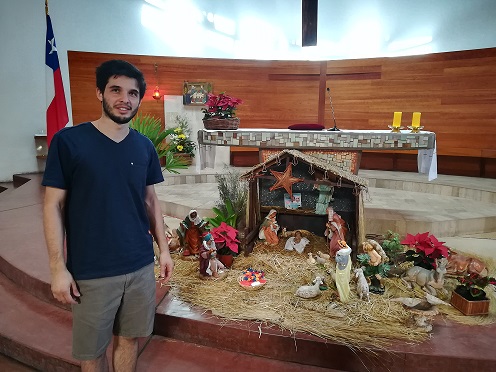Letter from Rome
While there are undoubtedly many ways to measure the greatness of an idea, here’s one: when it outlives its original application, and becomes a permanent part of a much larger reality.
That, in short, is the story of Catholic Voices, which is undoubtedly the most successful Catholic communications initiative of the last decade – and a nominee, at least, for being one of the most effective of all time.
Catholic Voices was born in 2010, in the run-up to Pope emeritus Benedict XVI’s trip to Britain. That outing was projected to be one of the most difficult any pontiff had ever faced, in part because of a secularised and sometimes openly anti-Catholic culture in Britain, in part because of the clerical sexual abuse scandals washing across Europe at the time, and in part because of the Darth Vader-esque caricature that often defined (and, of course, badly distorted) Benedict’s public image.
Two smart and entrepreneurial Catholics, Jack Valero of Opus Dei and Austen Ivereigh, a former editor for The Tablet, saw the train wreck coming and decided to do something about it. They formed a cadre of 24 smart, articulate lay Catholics and one priest, and gave them a six-month crash course in both media literacy and the hot-button issues expected to set the agenda for media coverage of Benedict’s visit.
The project was independent of officialdom, though it’s never been hostile to the Church’s official leadership. For the most part, actually, those leaders have embraced it heartily.
Commentary
After that basic Catholic ‘boot camp’, Dr Ivereigh and Mr Valero turned their charges loose, making them available more or less around the clock to any and all media outlets that needed commentary on the visit. The results were electric: Catholic Voices members became the soundtrack of the trip, shaping a narrative through more than 100 media appearances that was compelling, honest, and incredibly human.
In so doing, the group almost single-handedly debunked a whole series of myths and prejudices about people of Faith in Britain’s popular culture.
After Benedict was safely back in Rome, Valero and Ivereigh realised they’d set something special in motion. If they hadn’t gotten the point on their own, the scores of bishops, clergy, lay experts, media professionals and people from several other circles begging them to keep Catholic Voices going would have brought it home.
Today, there are more than 20 Catholic Voices groups in Europe, North and South America and Australia. The group’s philosophy, and its secret to success, can be simply stated: in the face of incomprehension and even hostility from the media, don’t get angry, reframe the conversation. The idea is to avoid defensiveness, and to identify with the values underlying the hostility (which often, even in distorted form, ultimately stem from Christianity).
There’s also a related Catholic Voices instinct – which is rarely made explicit in their official literature, but it’s absolutely real operationally – to bridge the usual partisan divides in the Church not only through conscious policy choices, but more importantly, through friendship.
Valero and Ivereigh, the co-founders, are the proof of the point: Valero and Opus Dei are typically seen as fairly conservative, while Ivereigh is viewed (especially in the Pope Francis era) as a strong progressive voice. Yet you’ll almost never find better friends than those two, and their spirit is contagious throughout the Catholic Voice network.
On Friday night, Crux’s team in Rome this week – which normally consists of Vatican correspondent Inés San Martín and faith and culture correspondent Claire Giangravè, buoyed this week by me and national correspondent Chris White – had the chance to drop in on a gathering of Catholic Voices personnel from more than 15 countries, taking place in the Eternal City.
Amazing work
In essence, I made a simple point: you people are doing amazing work in projecting a credible and attractive voice for the Church in the public square, and that’s no easy feat. In particular, I gave a shout-voice to the delegation from Catholic Voices in Chile – because if there’s anywhere on the planet right now where speaking rationally and sympathetically about the Catholic Church is a tough sell, it’s Chile, in the wake of that country’s ongoing sexual abuse scandals.
I also told the Catholic Voices crowd that in many ways, there’s a genetic link between their group and Crux. That’s not just because I’m old friends of both Valero and Ivereigh, and was there at the beginning eight years ago, and it’s not just because White, our stellar national correspondent, is a former staffer for Catholic Voices USA.
It’s also because Catholic Voices and Crux, in their own ways, are both in the same business – promoting smart, wired and independent conversation about the Catholic Church, either on one side of the fence as informal spokespersons, or on the other as journalists.
In any event, I told them I’m as much an admirer of Catholic Voices today as eight years ago. If you don’t know Catholic Voices, check them out, because there really is much to admire.
How to Defend the Faith Without Raising Your Voice, a new book co-written by The Irish Catholic Editor Michael Kelly and Austen Ivereigh, has just been published and is available now from www.columba.ie priced €14.99/£12.99.
John L. Allen Jr is Editor of Cruxnow.com


 John L. Allen Jr.
John L. Allen Jr. Ignacio Leiva, a volunteer for Catholic Voices, pictured in his parish in Santiago, Chile. Photo: CNS
Ignacio Leiva, a volunteer for Catholic Voices, pictured in his parish in Santiago, Chile. Photo: CNS 